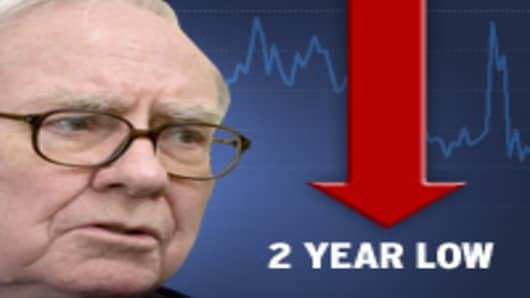CNBC's David Faber reports that Friday's earnings numbers from Berkshire have prompted some Wall Street investors to bet against Warren Buffett and his stock. Here's what David had to say this morning on CNBC's Squawk on the Street:
"It's never paid to bet against Warren Buffett, has it? Never, really, over any length of time in Berkshire Hathaway.
But interesting, the last few days, I've picked up some chatter, and actually some investors out there that are shorting Berkshire in part because of the report that was out Friday, the earnings report from Berkshire Hathaway, and some things they picked up in the 10-Q (filing with the SEC.)
One of the main things being that, well here it is, you can read it yourself.
'Based on (equity and) equity index prices as of October 31st (2008) applied to Berkshire's investment holdings and its equity index put option contracts, Berkshire estimates (that) consolidated shareholders' equity would decline by approximately nine billion dollars.'
What does that actually mean? Well, what it means is that Berkshire, which has a tangible book value of about 86 billion dollars, took that down by about nine billion. Why? Well, because it had a 40 billion dollar short index put position on. What does that mean? That means, actually, that he was betting on the market going up. Bullish, was Mr. Buffett on the market. You're short equity index puts, you are long, and so far, wrong.
That has come down to about, I guess we'd call in the current quarter, what, 37 billion, I think, is the notional value.
Now, by the way, Berkshire does not have to put up any collateral against that. Doesn't qualify as hedges, it's not reported in that sense. So, there is no need to put up collateral against that. That's important. But nonetheless, it's not a great position right now to be in.
Now, of course, others are also pointing to (Buffett's investments in) GE and Goldman Sachs saying, 'Hey look, he came in way early there, too. (See WSJ to Warren Buffett: Time to Get a New Crystal Ball.)
Here's a look at GE. (Stock chart price: $17.29) That just causes pain throughout this building and many others, doesn't it. Of course, Warren bought stock higher, not that much higher. What was it? 22?



